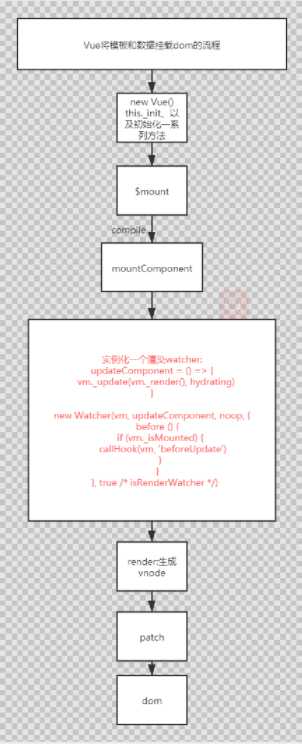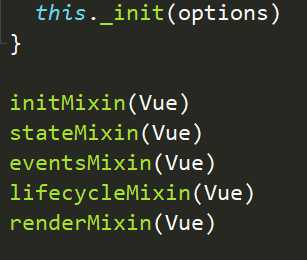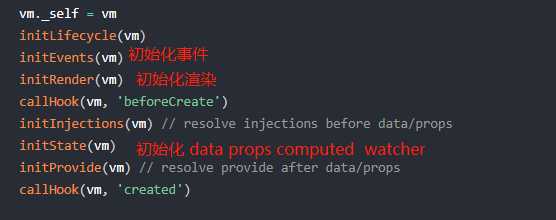
Vue其实是用Function写的一个class:
1、通过一系列的函数给Vue.prototype上动态挂载方法和属性

2、通过initGlobalAPI(Vue)给Vue本身扩展全局API
数据驱动:Vue的核心思想是数据驱动,所谓数据驱动,是指视图是由数据驱动生成的
new Vue()发生了什么?
合并配置,初始化生命周期,初始化事件中心,初始化渲染,初始化 data、props、computed、watcher


if (vm.$options.el) { vm.$mount(vm.$options.el) }
最后判断是否有el,如果有则调用vm.$mount挂载
$mount:
const mount = Vue.prototype.$mount Vue.prototype.$mount = function ( el?: string | Element, hydrating?: boolean ): Component { el = el && query(el) /* istanbul ignore if */
//对el做了限制,Vue不能挂载到html或body上
if (el === document.body || el === document.documentElement) { process.env.NODE_ENV !== ‘production‘ && warn( `Do not mount Vue to <html> or <body> - mount to normal elements instead.` ) return this } const options = this.$options // resolve template/el and convert to render function
//判断有没render函数,如果没有则会吧el或template生成render函数
if (!options.render) { let template = options.template if (template) { if (typeof template === ‘string‘) { if (template.charAt(0) === ‘#‘) { template = idToTemplate(template) /* istanbul ignore if */ if (process.env.NODE_ENV !== ‘production‘ && !template) { warn( `Template element not found or is empty: ${options.template}`, this ) } } } else if (template.nodeType) { template = template.innerHTML } else { if (process.env.NODE_ENV !== ‘production‘) { warn(‘invalid template option:‘ + template, this) } return this } } else if (el) { template = getOuterHTML(el) } if (template) { /* istanbul ignore if */ if (process.env.NODE_ENV !== ‘production‘ && config.performance && mark) { mark(‘compile‘) } //生成render const { render, staticRenderFns } = compileToFunctions(template, { shouldDecodeNewlines, shouldDecodeNewlinesForHref, delimiters: options.delimiters, comments: options.comments }, this) options.render = render options.staticRenderFns = staticRenderFns /* istanbul ignore if */ if (process.env.NODE_ENV !== ‘production‘ && config.performance && mark) { mark(‘compile end‘) measure(`vue ${this._name} compile`, ‘compile‘, ‘compile end‘) } } } return mount.call(this, el, hydrating) }
query方法:生成dom对象
export function query (el: string | Element): Element { if (typeof el === ‘string‘) { const selected = document.querySelector(el) if (!selected) { process.env.NODE_ENV !== ‘production‘ && warn( ‘Cannot find element: ‘ + el ) return document.createElement(‘div‘) } return selected } else { return el } }
原先原形上的$mount:
Vue.prototype.$mount = function ( el?: string | Element, hydrating?: boolean ): Component { el = el && inBrowser ? query(el) : undefined return mountComponent(this, el, hydrating) }
渲染wather
updateComponent = () => { vm._update(vm._render(), hydrating) } new Watcher(vm, updateComponent, noop, { before () { if (vm._isMounted) { callHook(vm, ‘beforeUpdate‘) } } }, true /* isRenderWatcher */)
mountComponent:核心就是实例化一个Watcher,在回调中调用updateComponent方法,
在此方法中调用vm._render生成Vnode,最终会调用vm._update更新dom
watcher的作用:
1、初始化时执行回调;2、当 vm 实例中的监测的数据发生变化的时候执行回调函数
render:
vnode = render.call(vm._renderProxy, vm.$createElement)
vm.$createElement = (a, b, c, d) => createElement(vm, a, b, c, d, true)
createElement:创建Vnode
export function createElement ( context: Component, tag: any, data: any, children: any, normalizationType: any, alwaysNormalize: boolean ): VNode | Array<VNode> { if (Array.isArray(data) || isPrimitive(data)) { normalizationType = children children = data data = undefined } if (isTrue(alwaysNormalize)) { normalizationType = ALWAYS_NORMALIZE } return _createElement(context, tag, data, children, normalizationType) }
export function _createElement ( context: Component, tag?: string | Class<Component> | Function | Object, data?: VNodeData, children?: any, normalizationType?: number ): VNode | Array<VNode> { if (isDef(data) && isDef((data: any).__ob__)) { process.env.NODE_ENV !== ‘production‘ && warn( `Avoid using observed data object as vnode data: ${JSON.stringify(data)}\n` + ‘Always create fresh vnode data objects in each render!‘, context ) return createEmptyVNode() } // object syntax in v-bind if (isDef(data) && isDef(data.is)) { tag = data.is } if (!tag) { // in case of component :is set to falsy value return createEmptyVNode() } // warn against non-primitive key if (process.env.NODE_ENV !== ‘production‘ && isDef(data) && isDef(data.key) && !isPrimitive(data.key) ) { if (!__WEEX__ || !(‘@binding‘ in data.key)) { warn( ‘Avoid using non-primitive value as key, ‘ + ‘use string/number value instead.‘, context ) } } // support single function children as default scoped slot if (Array.isArray(children) && typeof children[0] === ‘function‘ ) { data = data || {} data.scopedSlots = { default: children[0] } children.length = 0 } if (normalizationType === ALWAYS_NORMALIZE) { children = normalizeChildren(children) } else if (normalizationType === SIMPLE_NORMALIZE) { children = simpleNormalizeChildren(children) } let vnode, ns if (typeof tag === ‘string‘) { let Ctor ns = (context.$vnode && context.$vnode.ns) || config.getTagNamespace(tag) if (config.isReservedTag(tag)) { // platform built-in elements vnode = new VNode( config.parsePlatformTagName(tag), data, children, undefined, undefined, context ) } else if (isDef(Ctor = resolveAsset(context.$options, ‘components‘, tag))) { // component vnode = createComponent(Ctor, data, context, children, tag) } else { // unknown or unlisted namespaced elements // check at runtime because it may get assigned a namespace when its // parent normalizes children vnode = new VNode( tag, data, children, undefined, undefined, context ) } } else { // direct component options / constructor vnode = createComponent(tag, data, context, children) } if (Array.isArray(vnode)) { return vnode } else if (isDef(vnode)) { if (isDef(ns)) applyNS(vnode, ns) if (isDef(data)) registerDeepBindings(data) return vnode } else { return createEmptyVNode() } }
挂载dom上:
update
Vue.prototype._update = function (vnode: VNode, hydrating?: boolean) { const vm: Component = this const prevEl = vm.$el const prevVnode = vm._vnode const prevActiveInstance = activeInstance activeInstance = vm vm._vnode = vnode // Vue.prototype.__patch__ is injected in entry points // based on the rendering backend used. if (!prevVnode) { // initial render vm.$el = vm.__patch__(vm.$el, vnode, hydrating, false /* removeOnly */) } else { // updates vm.$el = vm.__patch__(prevVnode, vnode) } activeInstance = prevActiveInstance // update __vue__ reference if (prevEl) { prevEl.__vue__ = null } if (vm.$el) { vm.$el.__vue__ = vm } // if parent is an HOC, update its $el as well if (vm.$vnode && vm.$parent && vm.$vnode === vm.$parent._vnode) { vm.$parent.$el = vm.$el } // updated hook is called by the scheduler to ensure that children are // updated in a parent‘s updated hook. }
patch:
函数柯里化:指的是将一个接受多个参数的函数 变为 接受一个参数返回一个函数的固定形式,这样便于再次调用
const hooks = [‘create‘, ‘activate‘, ‘update‘, ‘remove‘, ‘destroy‘] export function createPatchFunction (backend) { let i, j const cbs = {} const { modules, nodeOps } = backend for (i = 0; i < hooks.length; ++i) { cbs[hooks[i]] = [] for (j = 0; j < modules.length; ++j) { if (isDef(modules[j][hooks[i]])) { cbs[hooks[i]].push(modules[j][hooks[i]]) } } } // ... return function patch (oldVnode, vnode, hydrating, removeOnly) { if (isUndef(vnode)) { if (isDef(oldVnode)) invokeDestroyHook(oldVnode) return } let isInitialPatch = false const insertedVnodeQueue = [] if (isUndef(oldVnode)) { // empty mount (likely as component), create new root element isInitialPatch = true createElm(vnode, insertedVnodeQueue) } else { const isRealElement = isDef(oldVnode.nodeType) if (!isRealElement && sameVnode(oldVnode, vnode)) { // patch existing root node patchVnode(oldVnode, vnode, insertedVnodeQueue, removeOnly) } else { if (isRealElement) { // mounting to a real element // check if this is server-rendered content and if we can perform // a successful hydration. if (oldVnode.nodeType === 1 && oldVnode.hasAttribute(SSR_ATTR)) { oldVnode.removeAttribute(SSR_ATTR) hydrating = true } if (isTrue(hydrating)) { if (hydrate(oldVnode, vnode, insertedVnodeQueue)) { invokeInsertHook(vnode, insertedVnodeQueue, true) return oldVnode } else if (process.env.NODE_ENV !== ‘production‘) { warn( ‘The client-side rendered virtual DOM tree is not matching ‘ + ‘server-rendered content. This is likely caused by incorrect ‘ + ‘HTML markup, for example nesting block-level elements inside ‘ + ‘<p>, or missing <tbody>. Bailing hydration and performing ‘ + ‘full client-side render.‘ ) } } // either not server-rendered, or hydration failed. // create an empty node and replace it oldVnode = emptyNodeAt(oldVnode) } // replacing existing element const oldElm = oldVnode.elm const parentElm = nodeOps.parentNode(oldElm) // create new node createElm( vnode, insertedVnodeQueue, // extremely rare edge case: do not insert if old element is in a // leaving transition. Only happens when combining transition + // keep-alive + HOCs. (#4590) oldElm._leaveCb ? null : parentElm, nodeOps.nextSibling(oldElm) ) // update parent placeholder node element, recursively if (isDef(vnode.parent)) { let ancestor = vnode.parent const patchable = isPatchable(vnode) while (ancestor) { for (let i = 0; i < cbs.destroy.length; ++i) { cbs.destroy[i](ancestor) } ancestor.elm = vnode.elm if (patchable) { for (let i = 0; i < cbs.create.length; ++i) { cbs.create[i](emptyNode, ancestor) } // #6513 // invoke insert hooks that may have been merged by create hooks. // e.g. for directives that uses the "inserted" hook. const insert = ancestor.data.hook.insert if (insert.merged) { // start at index 1 to avoid re-invoking component mounted hook for (let i = 1; i < insert.fns.length; i++) { insert.fns[i]() } } } else { registerRef(ancestor) } ancestor = ancestor.parent } } // destroy old node if (isDef(parentElm)) { removeVnodes(parentElm, [oldVnode], 0, 0) } else if (isDef(oldVnode.tag)) { invokeDestroyHook(oldVnode) } } } invokeInsertHook(vnode, insertedVnodeQueue, isInitialPatch) return vnode.elm } }
//createElm的作用是通过虚拟节点创建真实的 DOM 并插入到它的父节点中
function createElm ( vnode, insertedVnodeQueue, parentElm, refElm, nested, ownerArray, index ) { if (isDef(vnode.elm) && isDef(ownerArray)) { // This vnode was used in a previous render! // now it‘s used as a new node, overwriting its elm would cause // potential patch errors down the road when it‘s used as an insertion // reference node. Instead, we clone the node on-demand before creating // associated DOM element for it. vnode = ownerArray[index] = cloneVNode(vnode) } vnode.isRootInsert = !nested // for transition enter check if (createComponent(vnode, insertedVnodeQueue, parentElm, refElm)) { return } const data = vnode.data const children = vnode.children const tag = vnode.tag if (isDef(tag)) { if (process.env.NODE_ENV !== ‘production‘) { if (data && data.pre) { creatingElmInVPre++ } if (isUnknownElement(vnode, creatingElmInVPre)) { warn( ‘Unknown custom element: <‘ + tag + ‘> - did you ‘ + ‘register the component correctly? For recursive components, ‘ + ‘make sure to provide the "name" option.‘, vnode.context ) } } vnode.elm = vnode.ns ? nodeOps.createElementNS(vnode.ns, tag) : nodeOps.createElement(tag, vnode) setScope(vnode) /* istanbul ignore if */ if (__WEEX__) { // ... } else { createChildren(vnode, children, insertedVnodeQueue) if (isDef(data)) { invokeCreateHooks(vnode, insertedVnodeQueue) } insert(parentElm, vnode.elm, refElm) } if (process.env.NODE_ENV !== ‘production‘ && data && data.pre) { creatingElmInVPre-- } } else if (isTrue(vnode.isComment)) { vnode.elm = nodeOps.createComment(vnode.text) insert(parentElm, vnode.elm, refElm) } else { vnode.elm = nodeOps.createTextNode(vnode.text) insert(parentElm, vnode.elm, refElm) } }
insert:
function insert (parent, elm, ref) { if (isDef(parent)) { if (isDef(ref)) { if (nodeOps.parentNode(ref) === parent) { nodeOps.insertBefore(parent, elm, ref) } } else { nodeOps.appendChild(parent, elm) } } }
原文:https://www.cnblogs.com/365terry/p/13502779.html